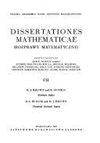非光滑域上梯度的加权不等式
IF 0.8
3区 数学
Q1 MATHEMATICS
引用次数: 1
摘要
在有界Lipschitz域上证明了椭圆型方程解u的梯度与其边界数据f之间的积分型加权范数不等式。0. 介绍。我们对以下一般性问题感兴趣:PDE解的内部平滑度在多大程度上受其边界值的大小控制?更具体地说,假设(现在)Ω∧R是一个很好的定义域,μ是一个在Ω中支持的正测度,v是一个在∂Ω中定义的非负可测函数。如果f:∂Ω→R是合理的(即具有紧支持的连续函数),则我们令u: Ω→R为经典Dirichlet问题的解,其边值等于f。(我们隐含地假设Ω足够好,可以让这个有意义!)设p和q是严格在1到∞之间的实数。何时(∫Ω |∇u|q dμ)1/q≤(∫)本文章由计算机程序翻译,如有差异,请以英文原文为准。
Weighted inequalities for gradients on non-smooth domains
We prove weighted norm inequalities of integral type between the gradients of solutions u of elliptic equations and their boundary data f on bounded Lipschitz domains. 0. Introduction. We are interested in the following general question: To what extent is the interior smoothness of the solution of a PDE controlled by the size of its boundary values? To be more specific, suppose (for now) that Ω ⊂ R is a nice domain, μ is a positive measure supported in Ω, and v is a non-negative measurable function defined on ∂Ω. If f : ∂Ω → R is reasonable (say, continuous function with compact support), we let u : Ω → R be the solution of the classical Dirichlet problem with boundary values equal to f . (We are implicitly assuming that Ω is nice enough to have this make sense!) Let p and q be real numbers lying strictly between 1 and infinity. When is it the case that (∫ Ω |∇u|q dμ )1/q ≤ (∫
求助全文
通过发布文献求助,成功后即可免费获取论文全文。
去求助
来源期刊
CiteScore
2.80
自引率
0.00%
发文量
8
审稿时长
>12 weeks
期刊介绍:
DISSERTATIONES MATHEMATICAE publishes long research papers (preferably 50-100 pages) in any area of mathematics. An important feature of papers accepted for publication should be their utility for a broad readership of specialists in the domain. In particular, the papers should be to some reasonable extent self-contained. The paper version is considered as primary.
The following criteria are taken into account in the reviewing procedure: correctness, mathematical level, mathematical novelty, utility for a broad readership of specialists in the domain, language and editorial aspects. The Editors have adopted appropriate procedures to avoid ghostwriting and guest authorship.

 求助内容:
求助内容: 应助结果提醒方式:
应助结果提醒方式:


